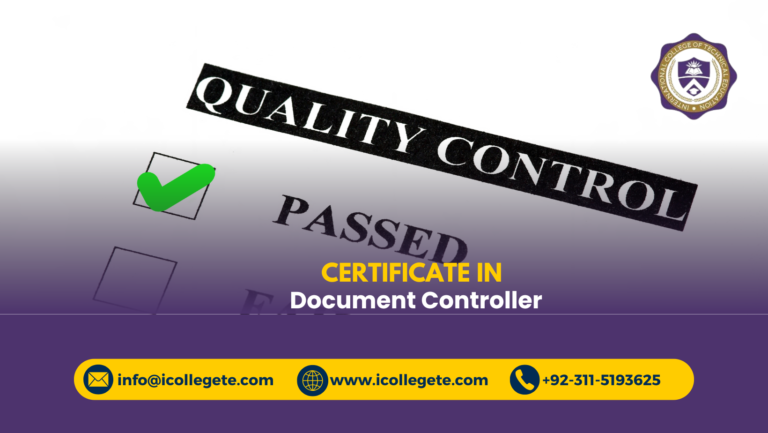The construction industry plays a vital role in the development of infrastructure, and quality control in civil engineering ensures that projects are executed efficiently and meet the required standards. A Quality Control Civil course in Islamabad is designed for individuals who want to gain a comprehensive understanding of quality management in civil engineering. This course provides essential knowledge and practical skills related to the inspection, testing, and monitoring of construction materials, processes, and project outcomes.
The Quality Control Civil course in Islamabad covers a broad spectrum of topics related to civil engineering and construction quality control. Students will gain a strong foundation in quality assurance processes, from understanding construction materials to implementing quality control systems on-site. The course combines theoretical knowledge with practical applications, preparing students to handle quality control tasks in civil projects. Whether you are new to civil engineering or an experienced professional looking to enhance your QC knowledge, this course is designed to meet your needs.
Study Units
The Quality Control Civil course typically includes the following study units:
- Introduction to Quality Control in Civil Engineering: This unit introduces the concepts of quality control, the importance of quality in civil engineering, and the role of QC professionals in the construction industry.
- Construction Materials and Testing: Learn about the properties and testing of various construction materials, such as concrete, steel, aggregates, and asphalt, to ensure they meet the necessary standards.
- Quality Control in Concrete: This unit focuses on the processes and methods used to ensure the quality of concrete, including mix design, strength testing, and curing techniques.
- Site Inspections and Monitoring: Explore the techniques for inspecting construction sites, monitoring ongoing work, and ensuring compliance with project specifications and quality standards.
- Statistical Methods for Quality Control: Learn how to apply statistical tools and techniques to monitor construction processes, analyze data, and make informed decisions regarding quality control.
- Quality Assurance and Compliance: This unit emphasizes the importance of compliance with local regulations and international standards such as ISO 9001, ensuring quality assurance in all phases of a construction project.
- Health, Safety, and Environmental Considerations: Understand the role of quality control in ensuring safety and environmental sustainability during construction projects, covering risk assessment, safety protocols, and environmental impact assessments.
Learning Outcomes
Upon completing the Quality Control Civil course, students will be able to:
- Understand the principles and practices of quality control in civil engineering projects.
- Identify the types of materials used in construction and conduct tests to ensure their quality.
- Implement quality control measures for concrete and other construction materials.
- Perform site inspections and monitor construction activities to ensure adherence to quality standards.
- Apply statistical methods to analyze quality data and control construction processes.
- Ensure compliance with regulatory standards and industry best practices.
- Contribute to maintaining a safe and environmentally sustainable construction site.
Course Benefits
- Practical Knowledge: Students gain hands-on experience in quality control processes, making them job-ready and capable of handling real-world construction projects.
- Industry Demand: There is a growing demand for skilled quality control professionals in the construction sector, and this course equips students with the skills needed to succeed in this field.
- Career Advancement: Completing the course opens up career opportunities for individuals already working in civil engineering, construction, or project management, helping them advance to roles focused on quality control.
- Enhanced Project Outcomes: By mastering quality control techniques, students will contribute to reducing defects, improving safety, and ensuring the successful completion of construction projects.
- Regulatory Knowledge: The course covers important regulatory standards, ensuring that students understand the legal aspects of quality control and compliance in construction projects.
- Networking Opportunities: Studying in a group setting allows students to network with professionals from the construction industry, building valuable connections for future career prospects.
Who Is This Course For?
The Quality Control Civil course is suitable for:
- Aspiring Civil Engineers: Individuals pursuing a career in civil engineering who want to specialize in quality control and assurance.
- Construction Professionals: Workers in the construction industry, including site engineers, project managers, and supervisors, who wish to enhance their skills in quality management.
- Quality Control Engineers: Professionals already working in quality control roles in construction who want to improve their knowledge and stay updated with the latest practices.
- Technicians and Inspectors: Those responsible for inspecting construction materials and processes who want to acquire formal training in quality control.
- Project Managers: Managers who oversee construction projects and want to ensure the application of best practices for maintaining quality throughout the project lifecycle.
Future Progression for This Course
After completing the Quality Control Civil course, students can progress in the following ways:
- Advanced Certifications: Students may choose to pursue further certifications in quality management systems, such as ISO 9001 or Six Sigma, to enhance their qualifications and career prospects.
- Higher Positions in Quality Control: Graduates may advance to positions such as Quality Control Manager, Senior Quality Assurance Engineer, or Construction Quality Manager, overseeing large-scale construction projects.
- Specialization in Construction Materials: Students can specialize in specific materials, such as concrete, steel, or asphalt, and become experts in their quality control.
- Master’s Degree in Civil Engineering: For those looking to expand their academic credentials, pursuing a Master’s degree in Civil Engineering with a focus on quality management or construction management can open doors to senior management and academic positions.
- Consulting: Experienced professionals can branch out into consulting, offering advice and expertise to construction companies on how to improve their quality control processes and systems.
the Quality Control Civil course in Islamabad is a crucial program for anyone looking to build a career in construction quality management. The course provides the necessary tools and knowledge to ensure the quality and integrity of civil engineering projects, offering students valuable skills that are in high demand in the industry. Whether you’re a newcomer to civil engineering or a professional looking to upgrade your skills, this course can be the stepping stone to a rewarding career in construction quality control.






